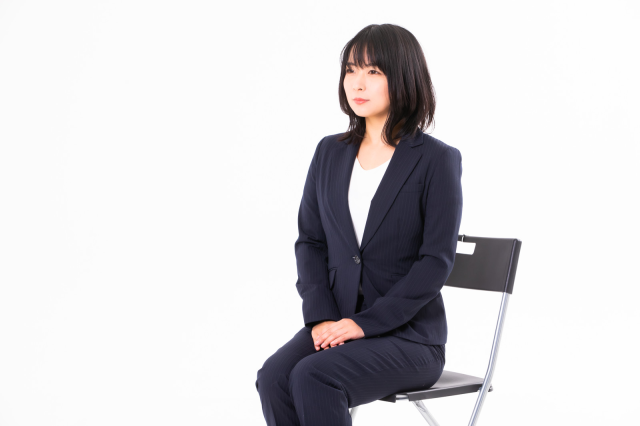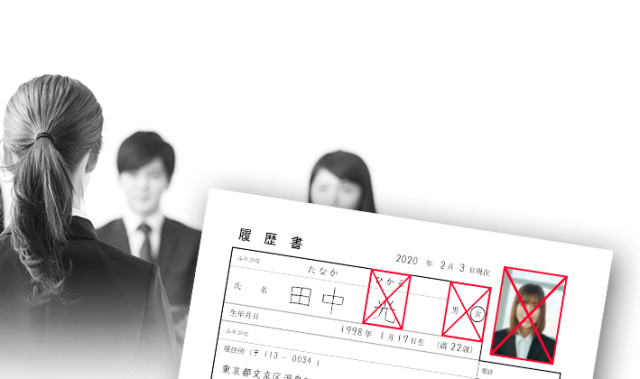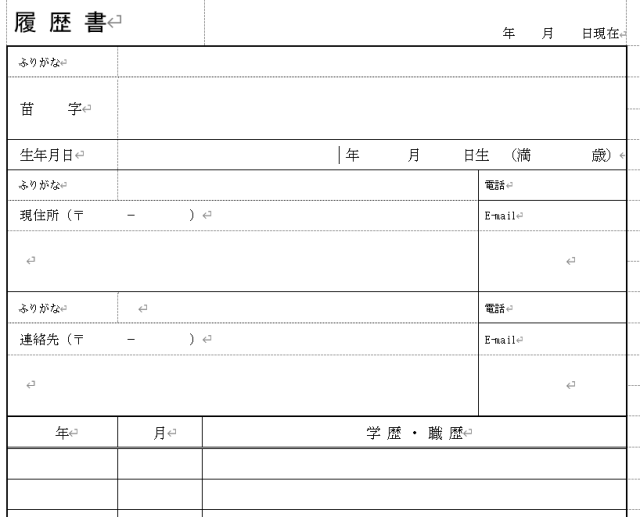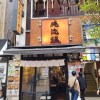
In Japan, looking for a job usually means snapping a photo, but not at this company.
Just like in other countries, writing a resume is an important part of job hunting in Japan, but in Japan you usually can’t complete your resume just by writing. Traditionally, Japanese resumes are also supposed to include a photo, and not one that shows off your creative flair or quirky personality.
Hair neatly combed, jacket and dress shirt (plus a tie if you’re a guy), and looking straight at the camera with a plain white background — basically, it’s like a formal-dress passport photo, and you’re supposed to stick one in the top right corner of your resume before you submit it with your application package. This isn’t something that’s only required for modeling, acting, or other jobs where your appearance is fundamentally connected to your ability to perform the role, either. If you want to be an accountant, a truck driver, or a medical researcher, you still need to show employers what you look like before you can even be considered for an interview.
If you’re thinking there’s no logical reason for that requirement, Unilever Japan agrees with you. The Japanese arm of the British-Dutch multinational, whose products include soaps and shampoos, has announced that as of this month it’s no longer requiring applicants to submit photos with their resumes.
The change, which applies to both new college graduates and mid-career job-seekers, is part of Unilever Japan’s Lux shampoo brand’s Social Damage Care Project, which holds that “All women have the right to shine.” In removing photos from resumes, Unilever says it wants to keep the focus on the individual’s job-related motivation and capabilities, not their gender or appearance. “If they are freed from the damaging constraints of being told how they must be in terms of appearance, age, profession, and home life, women will be able to shine more brightly,” declares the project’s mission statement.
To further attempt to remove gender from the equation, Unilever Japan is also no longer requiring applicants to specify a gender on their resumes, and is even going so far as to not ask for applicants to list their first name, as it could be used to surmise/assume what the person’s gender is.
▼ Ironically, the video promoting these new policies shows two applicants both named Hikaru, a common unisex Japanese name.
Sure enough, a look at Lux’s current downloadable resume form shows only a box for 苗字 (family name), and it no longer has the customary one for 名前 (given name). Despite the Social Damage Care Project’s professed ideal about freeing people from age-based prejudice, it does still ask for a date of birth, and also for the applicant to fill in their current age, but this could be a requirement to show that the applicant is a legal adult and eligible to enter into contracted, full-time employment.
One could make the argument that even for jobs where stylishness or attractiveness aren’t critical factors for success, personal appearance is a way by which to gauge the applicant’s maturity, as well as their commitment to/respect for the job and organization. Unilever Japan isn’t going to blind interviews, though, and so the non-verbal communication of “I care about this job enough to have showered and put on clean, business-appropriate clothes for it” is still something hiring managers can check for during the actual interview process. Being able to take a nice picture, though, is an ability the company has decided it doesn’t really care one way or the other about.
Source: Lux via Niconico News via Jin
Top image: Pakutaso
Insert images: Lux
● Want to hear about SoraNews24’s latest articles as soon as they’re published? Follow us on Facebook and Twitter!
Casey didn’t have to submit a photo to work at SoraNews24, but you can see what he looks like by following him on Twitter.



 Japanese high schools stop asking students to specify their gender on application forms
Japanese high schools stop asking students to specify their gender on application forms Fear and murder plague Western Japan golf courses over a checkbox on application forms
Fear and murder plague Western Japan golf courses over a checkbox on application forms New Pantene commercial interviews Japanese trans individuals about difficulties of job hunting
New Pantene commercial interviews Japanese trans individuals about difficulties of job hunting Looking for a job in Japan? Now you can work in the world of anime at the Ghibli Museum!
Looking for a job in Japan? Now you can work in the world of anime at the Ghibli Museum! Man forgets the first rule of Japanese job interviews: Don’t steal the boss’ wallet
Man forgets the first rule of Japanese job interviews: Don’t steal the boss’ wallet Japanese ramen restaurants under pressure from new yen banknotes
Japanese ramen restaurants under pressure from new yen banknotes McDonald’s new Happy Meals offer up cute and practical Sanrio lifestyle goods
McDonald’s new Happy Meals offer up cute and practical Sanrio lifestyle goods Non-ramen Ramen Restaurant Stars: The quest begins at Tokyo’s Oreryu Shio
Non-ramen Ramen Restaurant Stars: The quest begins at Tokyo’s Oreryu Shio New private rooms on Tokaido Shinkansen change the way we travel from Tokyo to Kyoto
New private rooms on Tokaido Shinkansen change the way we travel from Tokyo to Kyoto Sakura tree falls on man at Sannenzaka near Kiyomizu temple in Kyoto 【Breaking News】
Sakura tree falls on man at Sannenzaka near Kiyomizu temple in Kyoto 【Breaking News】 We tried Korea’s way-too-big King Tonkatsu Burger at Lotteria 【Taste Test】
We tried Korea’s way-too-big King Tonkatsu Burger at Lotteria 【Taste Test】 French Fries Bread in Tokyo’s Shibuya becomes a hit on social media
French Fries Bread in Tokyo’s Shibuya becomes a hit on social media Studio Ghibli releases new action figures featuring Nausicaä of the Valley of the Wind characters
Studio Ghibli releases new action figures featuring Nausicaä of the Valley of the Wind characters Secret Kitchen bento serves Japanese flowers, birds, wind and moon in a box, but is it worth it?
Secret Kitchen bento serves Japanese flowers, birds, wind and moon in a box, but is it worth it? Fried sandwiches arrive in Tokyo, become hot topic on social media
Fried sandwiches arrive in Tokyo, become hot topic on social media All-you-can-drink Starbucks and amazing views part of Tokyo’s new 170 meter-high sky lounge
All-you-can-drink Starbucks and amazing views part of Tokyo’s new 170 meter-high sky lounge More foreign tourists than ever before in history visited Japan last month
More foreign tourists than ever before in history visited Japan last month Starbucks reopens at Shibuya Scramble Crossing with new look and design concept
Starbucks reopens at Shibuya Scramble Crossing with new look and design concept Disney princesses get official manga makeovers for Manga Princess Cafe opening in Tokyo
Disney princesses get official manga makeovers for Manga Princess Cafe opening in Tokyo Beautiful new Final Fantasy T-shirt collection on the way from Uniqlo【Photos】
Beautiful new Final Fantasy T-shirt collection on the way from Uniqlo【Photos】 Is the new Shinkansen Train Desk ticket worth it?
Is the new Shinkansen Train Desk ticket worth it? Studio Ghibli glasses cases let anime characters keep an eye on your spectacles
Studio Ghibli glasses cases let anime characters keep an eye on your spectacles Studio Ghibli releases Kiki’s Delivery Service chocolate cake pouches in Japan
Studio Ghibli releases Kiki’s Delivery Service chocolate cake pouches in Japan New definition of “Japanese whiskey” goes into effect to prevent fakes from fooling overseas buyers
New definition of “Japanese whiskey” goes into effect to prevent fakes from fooling overseas buyers Our Japanese reporter visits Costco in the U.S., finds super American and very Japanese things
Our Japanese reporter visits Costco in the U.S., finds super American and very Japanese things Studio Ghibli unveils Mother’s Day gift set that captures the love in My Neighbour Totoro
Studio Ghibli unveils Mother’s Day gift set that captures the love in My Neighbour Totoro Domino’s Japan now sells…pizza ears?
Domino’s Japan now sells…pizza ears? New Japanese KitKat flavour stars Sanrio characters, including Hello Kitty
New Japanese KitKat flavour stars Sanrio characters, including Hello Kitty New Pokémon cakes let you eat your way through Pikachu and all the Eevee evolutions
New Pokémon cakes let you eat your way through Pikachu and all the Eevee evolutions Sales of Japan’s most convenient train ticket/shopping payment cards suspended indefinitely
Sales of Japan’s most convenient train ticket/shopping payment cards suspended indefinitely Sold-out Studio Ghibli desktop humidifiers are back so Totoro can help you through the dry season
Sold-out Studio Ghibli desktop humidifiers are back so Totoro can help you through the dry season Japanese government to make first change to romanization spelling rules since the 1950s
Japanese government to make first change to romanization spelling rules since the 1950s Ghibli founders Toshio Suzuki and Hayao Miyazaki contribute to Japanese whisky Totoro label design
Ghibli founders Toshio Suzuki and Hayao Miyazaki contribute to Japanese whisky Totoro label design Doraemon found buried at sea as scene from 1993 anime becomes real life【Photos】
Doraemon found buried at sea as scene from 1993 anime becomes real life【Photos】 Tokyo’s most famous Starbucks is closed
Tokyo’s most famous Starbucks is closed One Piece characters’ nationalities revealed, but fans have mixed opinions
One Piece characters’ nationalities revealed, but fans have mixed opinions We asked a Uniqlo employee what four things we should buy and their suggestions didn’t disappoint
We asked a Uniqlo employee what four things we should buy and their suggestions didn’t disappoint Princesses, fruits, and blacksmiths: Study reveals the 30 most unusual family names in Japan
Princesses, fruits, and blacksmiths: Study reveals the 30 most unusual family names in Japan Hayao Miyazaki still looking for talented staff to join Studio Ghibli for new anime production
Hayao Miyazaki still looking for talented staff to join Studio Ghibli for new anime production To handwrite, or not to handwrite? Recruiter lays into ‘laziness’ of young Japanese job hunters
To handwrite, or not to handwrite? Recruiter lays into ‘laziness’ of young Japanese job hunters Japanese ninja group wants to hire new member, must have strong aura and mental fortitude
Japanese ninja group wants to hire new member, must have strong aura and mental fortitude Manga-based game show ups the ante with part-time jobs offering $805 for two days’ work
Manga-based game show ups the ante with part-time jobs offering $805 for two days’ work Your new dream job? Nintendo Japan are hiring level designers for new 2-D game
Your new dream job? Nintendo Japan are hiring level designers for new 2-D game Man reported missing after 2011 Tohoku earthquake found alive and well
Man reported missing after 2011 Tohoku earthquake found alive and well Virtual reality Totoro? Project Morpheus team looking for artist with “Studio Ghibli” style
Virtual reality Totoro? Project Morpheus team looking for artist with “Studio Ghibli” style Pantene ad asks why people in Japan are forced to look the same when job hunting
Pantene ad asks why people in Japan are forced to look the same when job hunting Easier anime work visa requirements for foreign students being considered by Japanese government
Easier anime work visa requirements for foreign students being considered by Japanese government Welcome to the age of the “Insta-view”: Instagram interviews become popular in Japan
Welcome to the age of the “Insta-view”: Instagram interviews become popular in Japan Government form allows Japanese romantics to officially declare their love
Government form allows Japanese romantics to officially declare their love New Fuma ninja being recruited for first time in 400 years
New Fuma ninja being recruited for first time in 400 years Tokyo University of the Arts to offer graduate program in video game design next year
Tokyo University of the Arts to offer graduate program in video game design next year Four frustrating attitudes women in Japan run into when interviewing for jobs, grouped by age
Four frustrating attitudes women in Japan run into when interviewing for jobs, grouped by age Japanese ninja proficiency test to be held in Tokyo
Japanese ninja proficiency test to be held in Tokyo
Leave a Reply